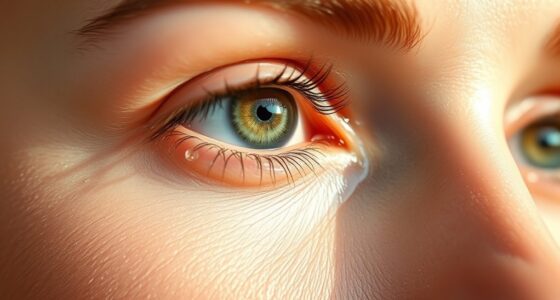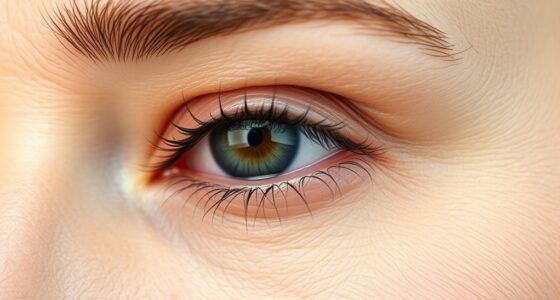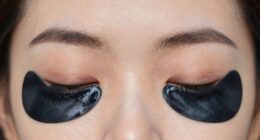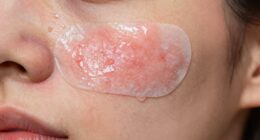Cataracts are a common eye condition that can blur your vision, especially as you age. To decrease your risk, focus on having a healthy diet rich in antioxidants, wear sunglasses that block UV rays, and schedule regular eye exams. Stay mindful of risk factors like smoking, diabetes, and long-term corticosteroid use. With these preventive measures, you can maintain your eye health effectively. Keep on exploring more tips to safeguard your vision for the future.
Key Takeaways
- Regular eye exams are essential for early detection and management of cataracts, especially for those over 60 or with risk factors.
- Protect your eyes from UV rays by wearing sunglasses that block 100% of UVA and UVB and using broad-brimmed hats.
- Maintain a healthy diet rich in antioxidants, omega-3 fatty acids, and colorful fruits and vegetables to support eye health.
- Manage diabetes and blood sugar levels, as they significantly increase the risk of cataract development.
- Avoid smoking, as it doubles the likelihood of developing cataracts compared to non-smokers.
Understanding Cataracts: What You Need to Know

Cataracts, which cause the lens of your eye to become cloudy, can greatly impact your vision as you age. By the time you reach 80, it’s likely you’ll either have cataracts or have undergone surgery for them.
This common condition leads to blurred vision, difficulty seeing at night, and trouble with glare. Understanding cataracts is important for effective prevention.
You can reduce your risk by wearing UV-blocking sunglasses to protect your eyes from harmful rays. Eating a diet rich in antioxidants and managing health issues like diabetes also plays a significant role in prevention.
Taking these proactive steps can help maintain your vision and quality of life as you get older, making cataract awareness essential.
Risk Factors for Cataract Development

As you age, your chances of developing cataracts increase considerably, with nearly 50% of people over 75 affected by this condition. Understanding the risk factors can help you take preventive steps.
| Risk Factor | Description | Prevention Tips |
|---|---|---|
| Aging | Major risk factor; 50% of individuals over 75 affected | Regular eye exams |
| UV Exposure | Prolonged sun exposure increases risk | Wear UV-blocking sunglasses |
| Smoking | Smokers are twice as likely to develop cataracts | Quit smoking |
| Diabetes | Diabetics face higher cataract risk | Manage blood sugar levels |
| Corticosteroids | Long-term use raises cataract risk | Discuss alternatives with your doctor |
The Role of Nutrition in Eye Health

Maintaining proper nutrition is essential for supporting eye health and potentially preventing cataracts. A diet rich in antioxidants, especially vitamins C and E, helps combat oxidative stress in your eyes. Additionally, incorporating foods like rapeseed honey can boost your antioxidant intake, further supporting eye health. Regularly consuming celery juice powder can also enhance your nutrient profile, providing essential vitamins that benefit your vision.
Consuming omega-3 fatty acids from fish or flaxseeds can lower your risk of cataracts and enhance overall eye health. Don’t forget about lutein and zeaxanthin found in leafy greens like spinach and kale; they provide protective effects against cataracts.
Make sure to eat plenty of brightly colored fruits and vegetables as they offer essential nutrients vital for eye health. Additionally, managing your weight and diabetes through a healthy diet can reduce the risk of cataracts a lot less.
Including foods high in vitamins A, C, and K can also contribute to improved eye health and overall well-being.
Prioritize your nutrition for clearer vision and healthier eyes.
Protective Measures Against UV Exposure

Protecting your eyes from UV radiation is crucial in reducing the risk of cataract development.
Studies show that UV exposure can increase your risk of cataracts by up to 20% over a lifetime, so you still need to take protective measures. Wearing sunglasses that block 100% of UVA and UVB rays is essential; this greatly lowers your UV exposure.
Additionally, donning a broad-brimmed hat shields your eyes from direct sunlight, especially during peak hours between 10 AM and 4 PM.
Importance of Regular Eye Examinations
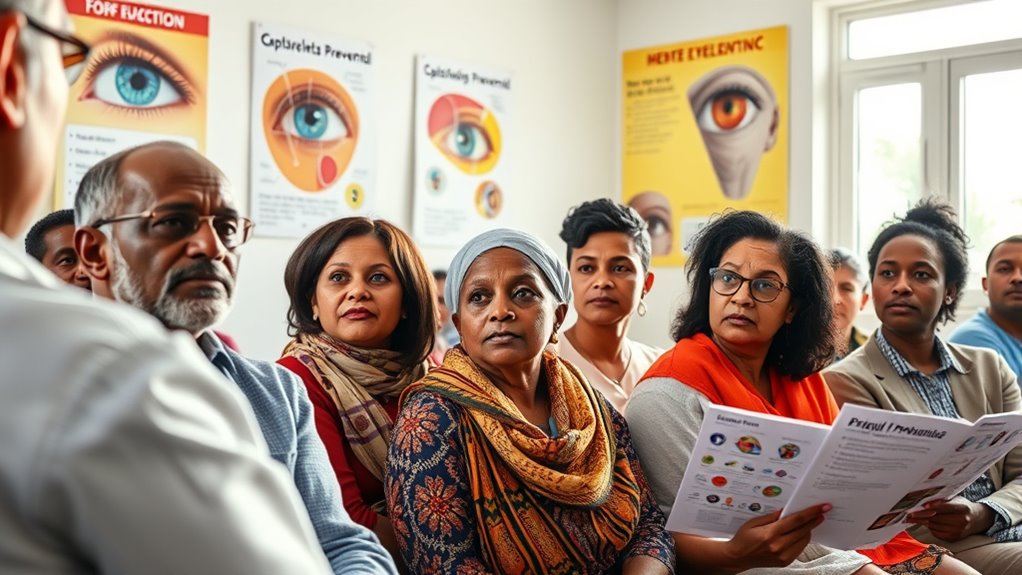
Regular eye examinations play an important role in catching cataracts early and preventing vision loss. The American Academy of Ophthalmology recommends that you get thorough eye exams every one to two years if you’re over 60. This early diagnosis is vital, as timely surgical intervention can greatly improve your quality of life. If you have risk factors, like diabetes or a family history of cataracts, you should schedule exams more frequently.
| Frequency | Recommended Age | Risk Factors |
|---|---|---|
| Every 1-2 years | Over 60 | Diabetes, Family History |
| Annually | Any age with risk | Previous eye issues |
| Every 2 years | 40-60 | None |
Stay proactive about your eye health!
Frequently Asked Questions
What Is the Best Prevention for Cataracts?
To prevent cataracts, you should start with regular eye exams to catch early signs.
Protect your eyes from UV rays by wearing sunglasses that block UV light. Eating a diet rich in antioxidants—think colorful fruits and leafy greens—can help too.
If you smoke, quitting is essential, and you should limit alcohol intake.
Finally, manage any chronic conditions like diabetes to keep your blood sugar levels stable, reducing your cataract risk.
What Is the New Method of Cataract Surgery?
In the world of eye care, change is the only constant. The new method of cataract surgery often uses phacoemulsification, where ultrasound waves break up the cloudy lens for easy removal.
You’ll benefit from quicker recovery times and minimal discomfort. Advanced techniques like femtosecond lasers enhance precision, while wavefront aberrometry corrects refractive errors during the procedure.
With premium intraocular lenses, you’ll enjoy improved vision at various distances, making your experience even better.
Is There Anything You Can Do to Slow Down Cataracts?
Yes, you can take steps to slow down cataracts.
Start by scheduling regular eye exams to catch any early signs. Protect your eyes from UV rays by wearing sunglasses with UV protection.
Incorporate a healthy diet rich in antioxidants, like fruits and vegetables, into your meals. Control conditions like diabetes and hypertension, and consider quitting smoking or limiting alcohol consumption.
These lifestyle changes can greatly reduce your risk and help maintain your eye health.
What Are the Negatives of Having Cataract Surgery?
You might think cataract surgery is a guaranteed fix, but there are risks involved.
While serious complications are rare, you could face issues like infection or inflammation. Post-surgery, you might experience temporary symptoms such as glare or halos, impacting your night vision.
Additionally, about 20% of patients may develop posterior capsule opacification, requiring further treatment. If you have pre-existing eye conditions, your risk for complications could be higher.
Always weigh the benefits against these potential negatives.
Conclusion
Now that you’re armed with knowledge about cataracts, picture your eyes as precious gems—bright, clear, and full of life. By embracing healthy habits, nourishing your body, and shielding your eyes from harmful rays, you’re crafting a vibrant future for your vision. Regular check-ups become your safety net, catching any issues before they cloud your sparkle. Remember, prevention starts now, and each small step you take is like polishing those gems, ensuring they shine brilliantly for years to come.



